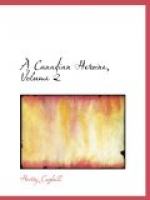“You remember this crossing?” he said to Mrs. Costello; “it was by this way that you left the island.”
“With my baby in my arms. Yes; I am not likely to forget it.”
They took their places in the boat, where an Indian boy was waiting. Mr. Strafford took an oar, and they glided out of the light and noise of the shore into the starry darkness.
Very few words passed as they crossed the river. Mrs. Costello’s mind was full of thoughts of her life here, and Lucia looked forward with wondering curiosity to the sight of an Indian settlement. She was conscious, too, that the feeling of terror and dislike, which for so many years of her life had been always awakened by the sight of one of her father’s people, was not even now altogether extinguished. Since she had known her own origin she had tried to get rid of this prejudice more earnestly than before, but the habit was so strong that she had not yet quite mastered it. She sat and watched the shadowy outline of the Indian boy’s figure in the boat, and lectured herself a little on the folly and even wickedness of her sensations.
They had to pass round the lower end of the island, where the village lay, in order to reach Mr. Strafford’s house; but the lights were all extinguished, and the inhabitants already asleep. They coasted along, passing a little wooden pier, and some fishing-boats and canoes lying moored beside the beach, and at last came to a boarded landing-place with a small boat-house at one end. Here they stopped, and Mr. Strafford bidding his boy run up to the door and knock, assisted the strangers to land. They were scarcely out of the boat when a bright gleam of lamplight flashing from the open door showed them a sloping path, up which they went, and found themselves in a bright warm room, all glowing with lamplight and firelight. A very neat little old woman in a Quaker-like cap and dress was ready to welcome them, and in front of the great blazing fire a table stood ready for supper. The old woman Mr. Strafford introduced as his housekeeper, Mrs. Hall, and Mrs. Costello recognized her as her own successor in the charge of that school for Indian women and girls of which she had told Lucia.
The room in which supper was laid, and into which the outer door opened, was large and square. At each end two smaller ones opened off it—on one side Mr. Strafford’s study and bedroom, at the other Mrs. Hall’s room and the one which had been prepared for the guests. Here also a fire burned brightly on the hearth, shining on the white walls and on the bed where, years ago, Mrs. Costello had watched her baby through its first illness. She sat down for a moment to recall that time, and to recognize bit by bit the familiar aspect of the place; then she made haste to lay aside her wrappings and get ready for supper.
It was quite ready by this time—the most luxurious meal Mrs. Hall’s resources could provide. There was coffee—not to be praised in itself, but hot, and accompanied by an abundance of cream. There were venison steaks, and a great pile of buckwheat cakes that moment taken from the fire, with a glass dish of clear golden maple syrup placed beside them, and expressly intended for Lucia’s benefit. Altogether not a meal to be despised.




